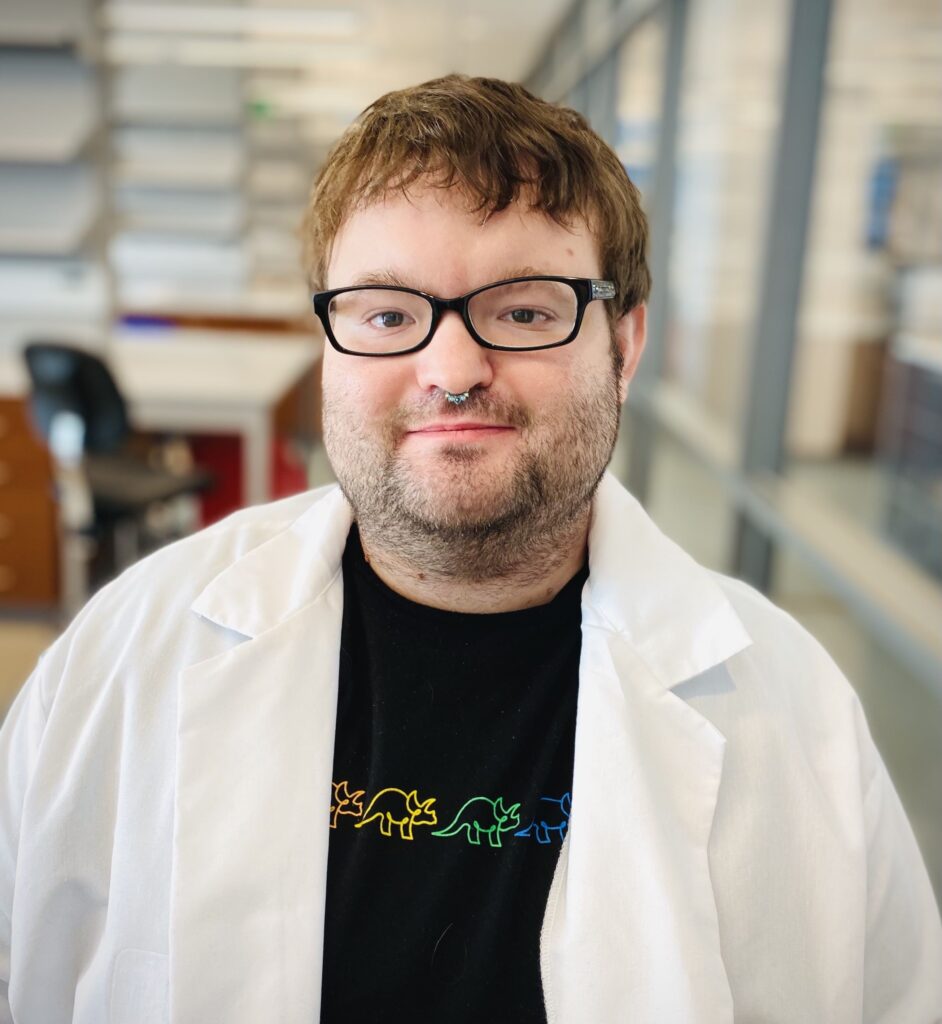Andrew McShan
Contact Information
- andrew.mcshan@chemistry.gatech.edu
- Phone
- (404) 385-6052
- Location
- MoSE G022
- Research Group
- McShan lab @ Georgia Tech
- Publication Links
- Google Scholar

Andrew McShan
Assistant Professor
Awards
- NSF CAREER Award - 2025
- Shurl and Kay Curci Foundation Research Grant - 2024
- Thank A Teacher Certificate; Georgia Tech Center for Teaching and Learning - 2022–2024
- Inclusive STEM Teaching Fellow, Georgia Tech - 2023
Education
- A.Sc. University of Houston, 2008
- B.Sc. University of Kansas, 2010
- Ph.D. University of Kansas, 2016
- Postdoctoral Research, University of California Santa Cruz, 2016-2020
- Postdoctoral Research, University of Pennsylvania & Children’s Hospital of Philadelphia, 2020-2022
Research
Research in the McShan lab has a wide scope and includes:
- Structural biology: We determine atomic structures, dynamics, and functions of biomolecules with biological relevance and therapeutic potential. Examples of recent structural biology projects: De novo designed proteins; Therapeutic peptides; Lipid transfer proteins; Proteins in natural product biosynthesis; Immunoreceptors and antibodies (i.e., Classical and Non-Classical Major Histocompatibility Complex Molecules, T cell receptors, CD8 co-receptors, monoclonal antibodies).
- Immunological antigens: We identify and characterize antigens (peptides, small molecules, lipids) involved in adaptive and innate immune responses. In particular, we focus on antigen presentation by the major histocompatibility complex (MHC) family of proteins and their biomolecular interaction with cellular receptors, such as T cell receptors. We aim to understand how antigens regulate immune responses, and also to harness the intrinsic features of antigens for therapeutics. We also study proteins with MHC-like folds, such as Zinc alpha 2-glycoprotein (ZAG).
- Modeling Lipid/Protein Interactions: We develop new computational tools, either sequence or structure based, to discover, characterize, and model the interaction between lipids and proteins. Examples of recent projects in modeling lipid/protein interactions: Development of structure databases of lipid/protein assemblies; Benchmarking physics- and machine learning-based structure prediction and molecular docking software on lipid/protein assemblies; Large-scale pocket analysis of lipid binding proteins in relation to small molecule/protein and protein/protein interfaces; Fine-tuning of structure prediction tools for enhanced modeling of lipid/protein assemblies.
- Lipid transfer proteins and lysosomal hydrolases: We study the structure and function of lipid transfer proteins and lysosomal hydrolases to elucidate their role in lipid trafficking/homeostasis, lipid antigen presentation, and rare lipid storage disorders.
- De novo protein design: We design new proteins that don't exist in nature. This allows us to uncover fundamental insights into the folding and interactions of biomolecules and biomolecular assemblies, while also providing avenues to novel therapeutics. We are interested in designing lipid-binding proteins, enzymes with new catalytic activity, fold-switching proteins, protein-based soft materials, biosensors, antagonists of protein-protein interactions, and more!
- Natural product biosynthesis: We seek to identify and characterize the precursor proteins and modifying enzymes involved in biosynthesis of natural products, especially ribosomally synthesized and post-translationally modified peptides (RiPPs).
We are not focused on any particular approach or technique, although we are particularly fond of solution nuclear magnetic resonance (NMR) spectroscopy. We strive to solve outstanding biological questions with relevance to basic biology, immunology, medicine, and pathology. Trainees joining our lab will gain hands on experience in biochemical/biophysical characterization of protein-protein and lipid-protein interactions (surface plasmon resonance, isothermal titration calorimetry, microscale thermophoresis, nano differential scanning fluorimetry, circular dichroism spectroscopy), structural biology (solution NMR, X-ray crystallography, cryo-electron microscopy, small angle x-ray scattering), computational biology (structure prediction, molecular dynamics simulations, molecular docking), protein design/engineering, chemical biology, and immunological assays.
We openly welcome members of the LGBTQAI+ community, women, disabled scientists (including those with invisible disabilities), and scientists of color.